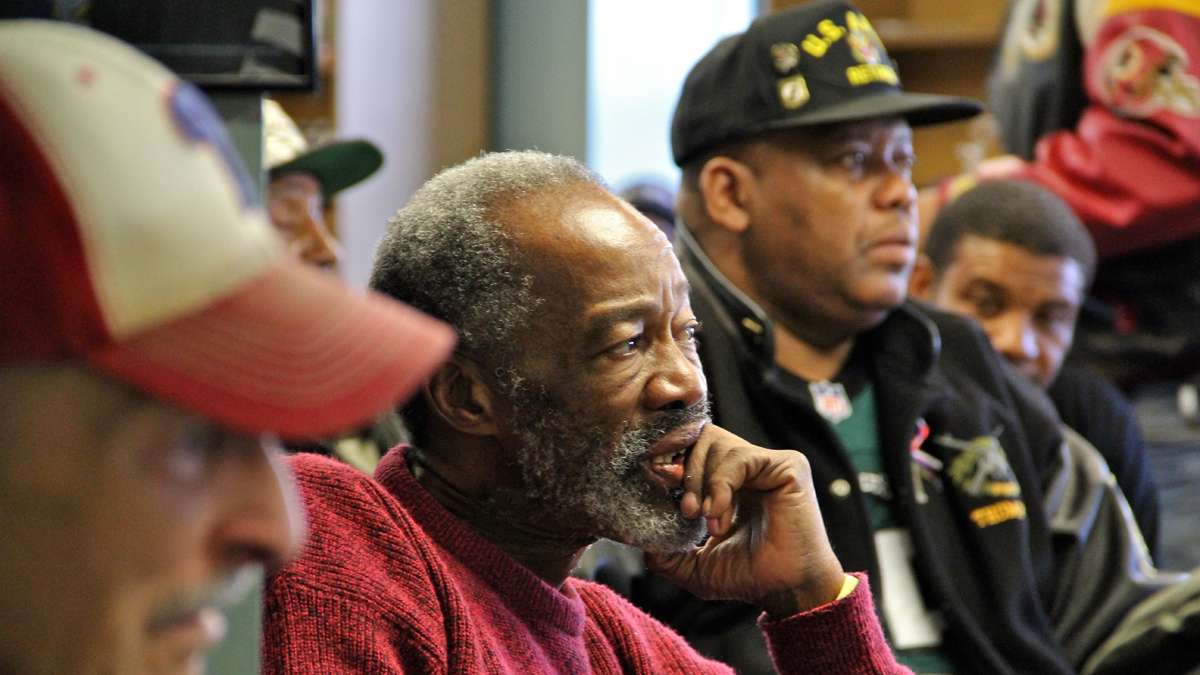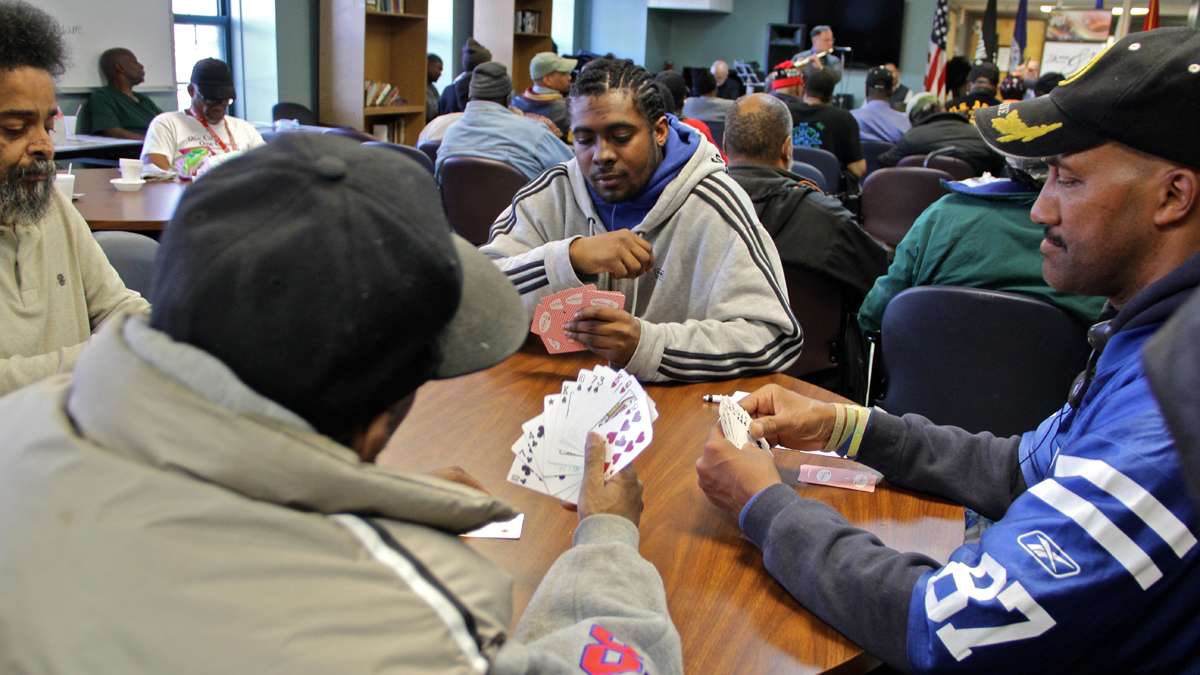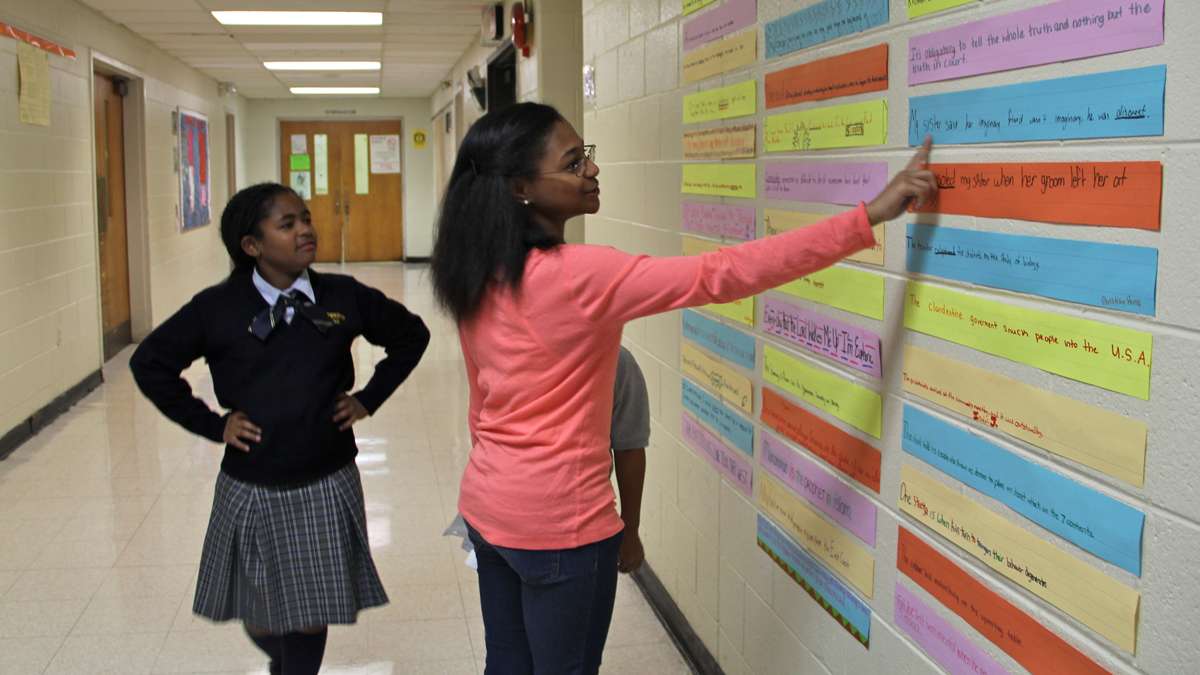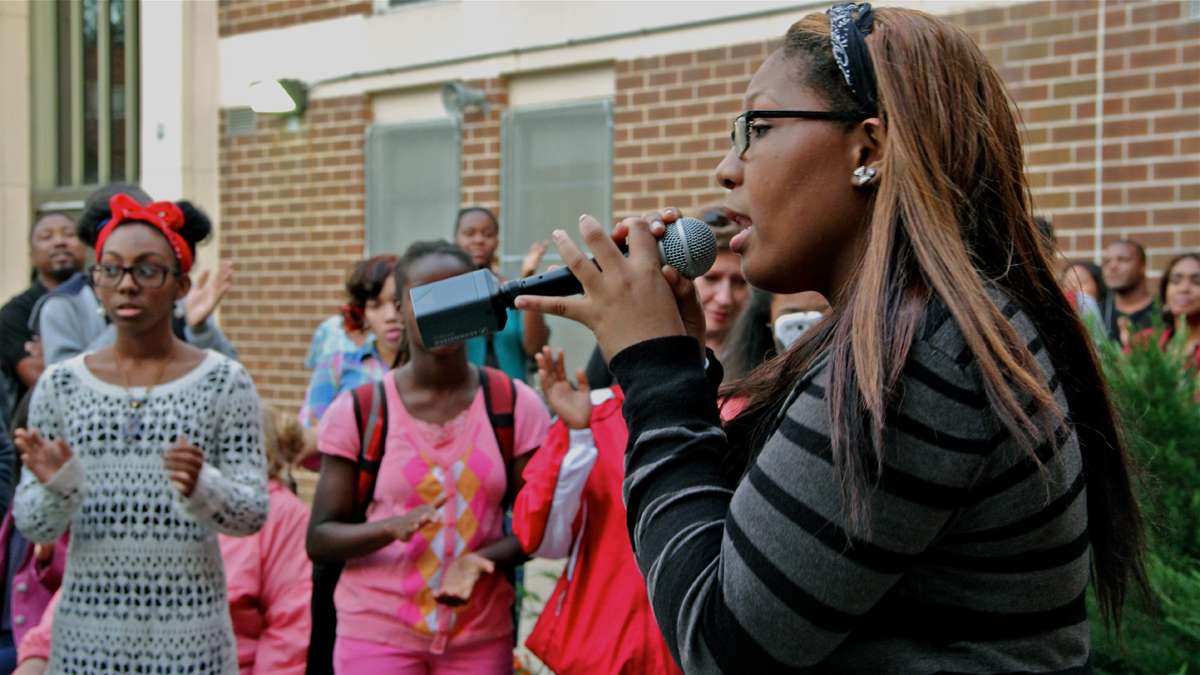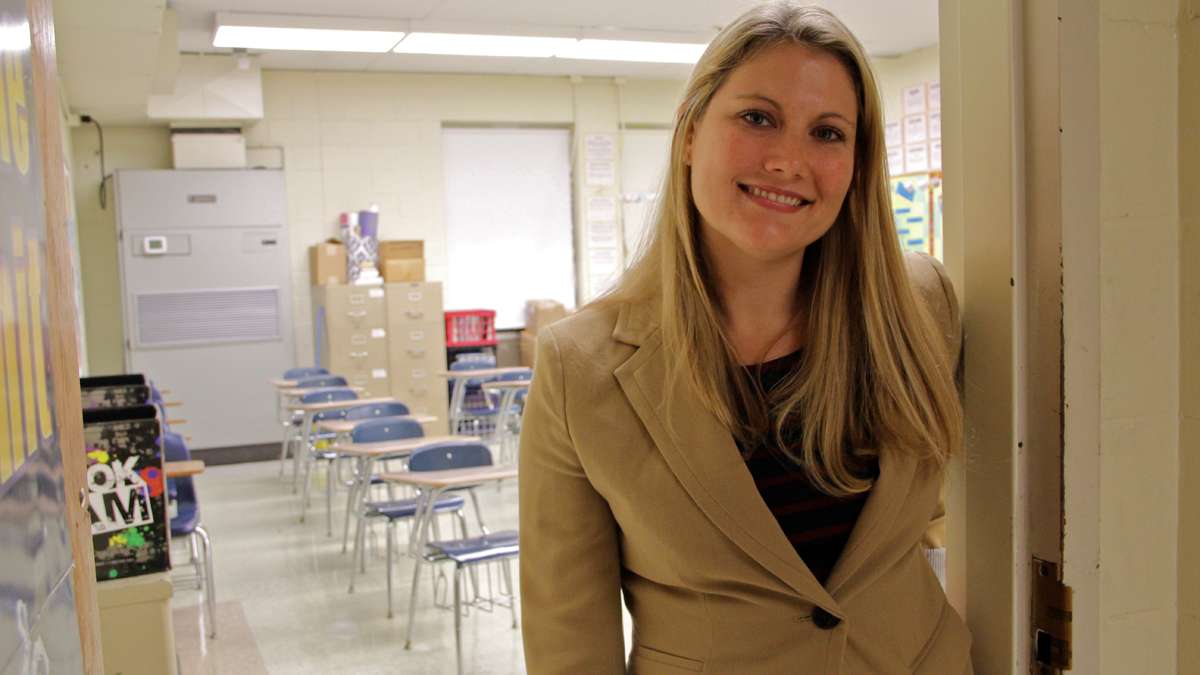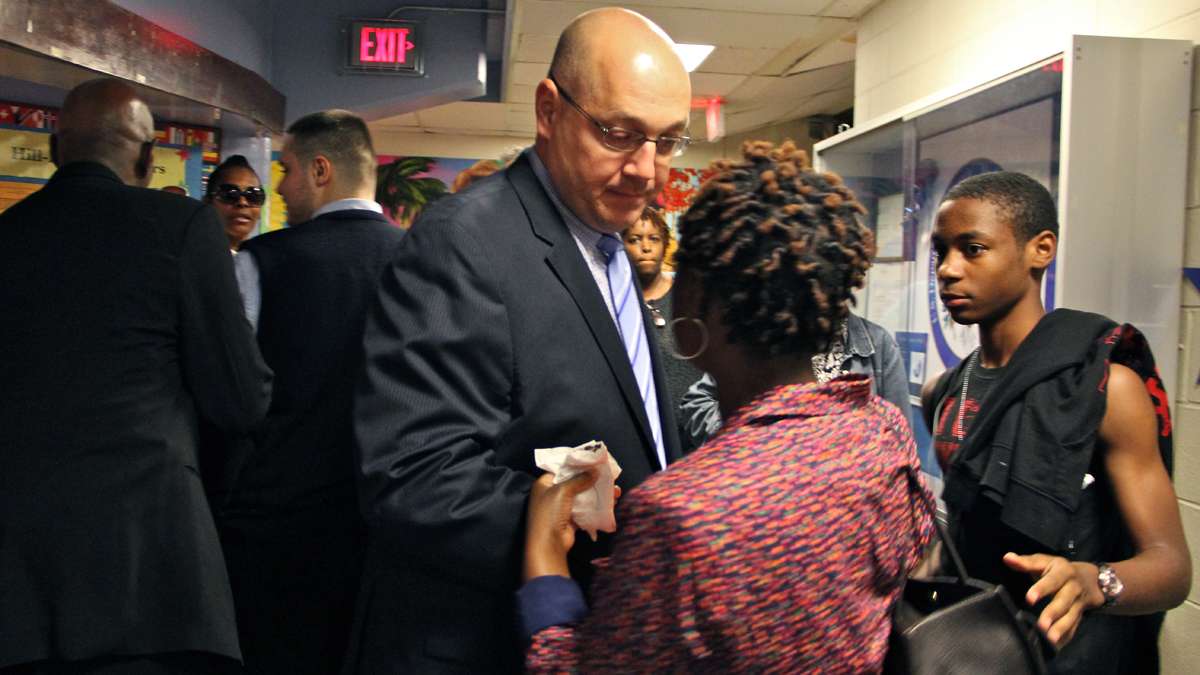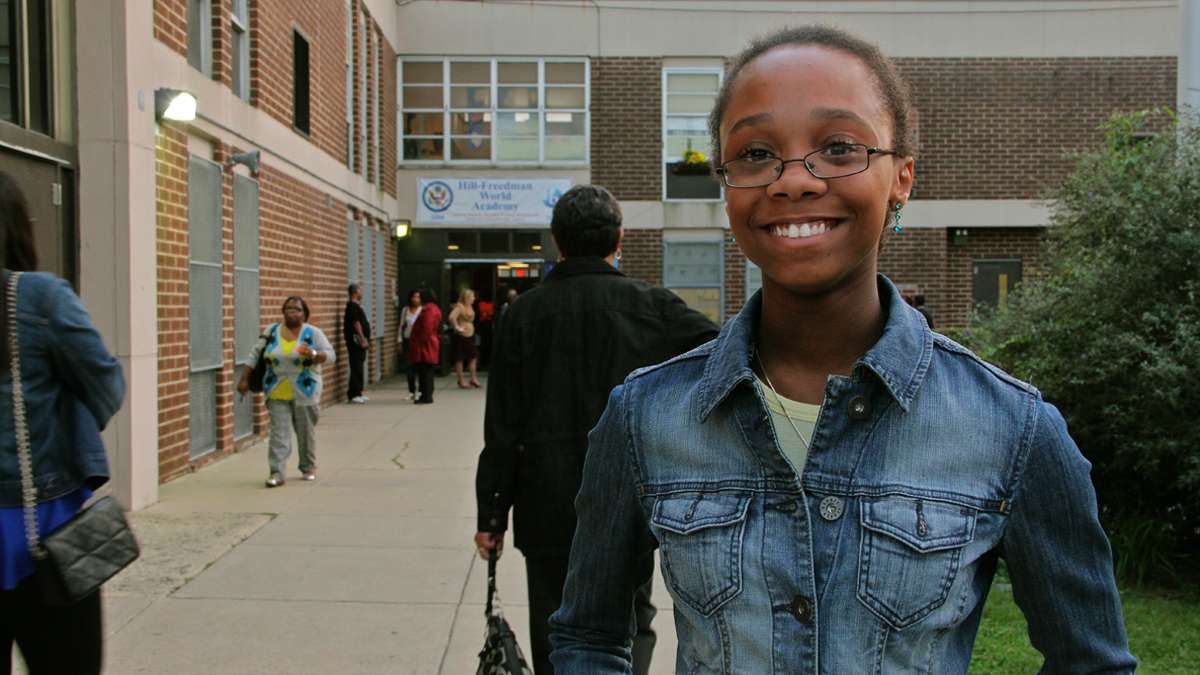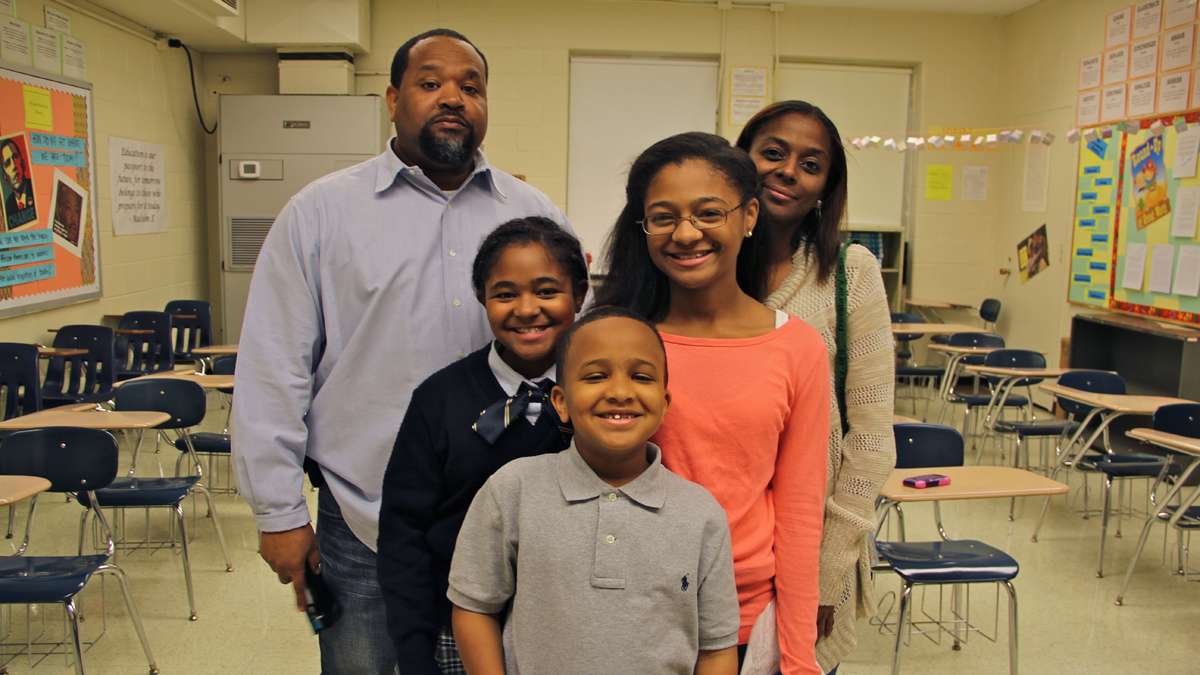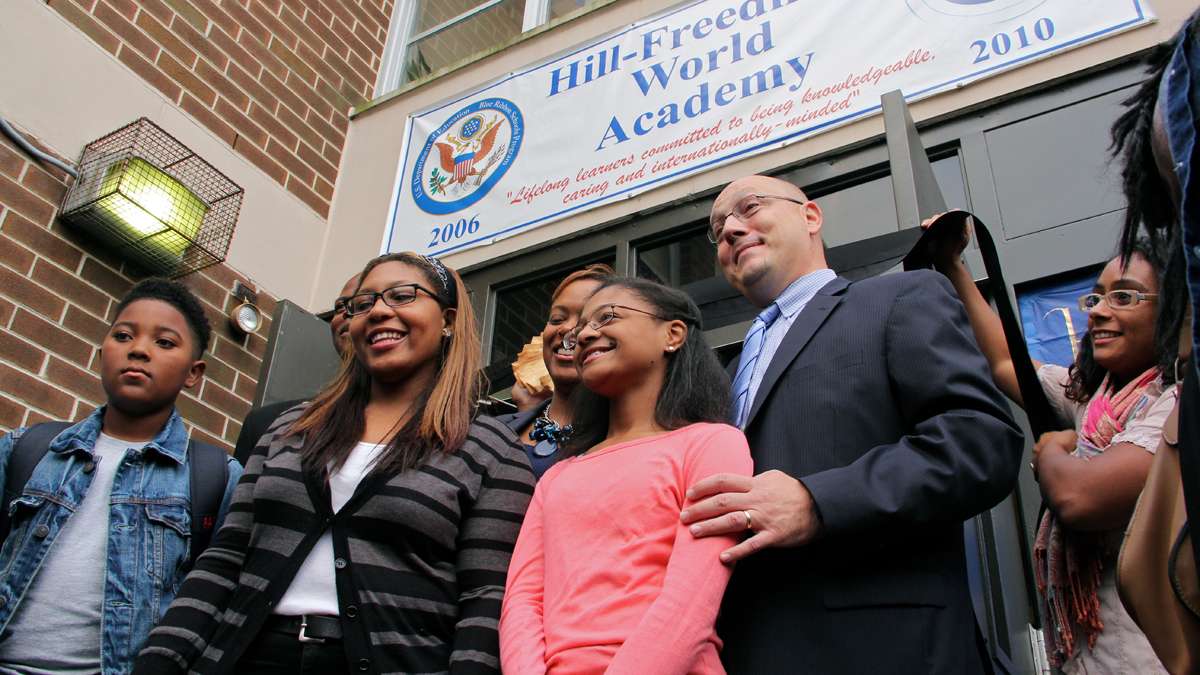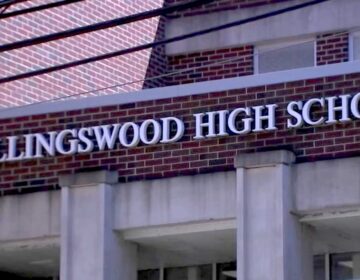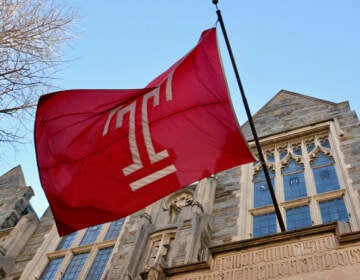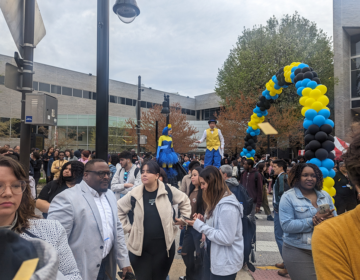Philly students risk a lot to buy into charismatic principal’s vision
ListenAnthony Majewski learned at an early age what it means to lose trust in the powers that be.
As a sixth-grader, he says he was “jacked up” by a math teacher who told him he was “never going to be anybody.”
“Like he actually jacked me up, and put me up against the wall, ’cause I don’t sit still too well,” Majewski said, chuckling. “I don’t think they had ADHD back then.”
Although he laughs it off now, it was a moment that forged the educational philosophy of the man who is now principal at the Philadelphia School District’s Hill-Freedman World Academy.
“That’s kind of my passion,” he said, “creating an environment where kids never feel like that.”
Talk to students, parents and faculty at Hill-Freedman, and they’ll tell you, so far, Majewski, 44, has succeeded.
But talk to Majewski himself and he’ll tell you that this year will prove to be his greatest test in maintaining that trust.
That, he says, is the challenge of expanding a school in the midst of a district-wide budget crisis.
The pitch
Hill-Freedman is a small, selective-admission traditional public school in Northwest Philadelphia. It’s an International Baccalaureate program that serves a student body that’s 91.7 percent African-American and 83.4 percent economically disadvantaged.
The school itself divides into two parts: One is a magnet program where the best and brightest learn a world-minded curriculum at an accelerated pace above their grade levels.
Hill-Freedman tailors the other part specifically for the needs of intellectually and physically disabled students with complex support needs.
Although the two student types follow a separate curriculum, the school prides itself on providing “as many opportunities for inclusion as possible,” including mixing its complex-needs and magnet students in elective courses such as cooking and ceramics.
Children applying for admission to the magnet program must score well on state tests, and have report cards report cards from their previous two years sporting all ‘As’ and ‘Bs.’ And their attendance rate must be 95 percent or better with a maximum of five tardy arrivals.
Among all middle schools in Pennsylvania, Hill-Freedman ranks sixth-best in aggregate English and math middle school PSSA testing – second only to Julia R. Masterman among Philadelphia’s other traditional-public middle schools.
Until this year, the school served grades 6-8, but after conversations with the Hill-Freedman community — specifically with complex-needs parents who disliked the idea of sending their children to nearby Martin Luther King High School — Majewski convinced the district to let him expand it into a high school.
Majewski then made this pitch to his magnet-school eighth graders — 95-percent of whom typically would have gone to the district’s long-esteemed, high-performing high schools: Don’t go to Central or Girls High, he cajoled. Instead, stay here and become Hill-Freedman’s first ninth-grade class.
Under pressure
Destinae Mason was initially skeptical. As a high-achieving eighth grader, she had the potential to go to the school of her choice, but her dad wanted her to stay at Hill-Freedman.
“And I was just like, ‘No, I want to go to Girls’ High.’ My mind was set on it,” said Mason. “And then Mr. Majewski started giving us these little meetings about what would happen and what we’d be doing, and I was like, ‘You know what? I’m going to do what my dad said and come here.'”
Between Hill-Freedman middle schoolers and kids from other schools around the city, 40 of these high-achieving magnet students took the offer. So did 18 students with complex support needs.
But there’s a big problem moving forward: The current Hill-Freedman building is already at its maximum capacity. It can handle the new ninth grade, but not a 10th, let alone an 11th and 12th as well.
Now, in a district plagued by financial instability, Majewski is in a race against the clock to find a new building and keep the trust of the students who’ve put their futures in his hands.
“You know,” he said, “I got a couple of kids saying, ‘I gave up Central for you, Mr Majewski. You gotta make this right for us.’ So the pressure is on.”
Creating a high school
Despite the uncertainty, Destinae Mason says she’s happy with her choice — in large part because of Majewski, who invited students to help create the new high school along with him.
He allowed students to vote for some of the curriculum, choose school uniforms, and in one case, even cast the deciding vote in a new faculty hire.
“For their language-arts teacher,” said Majewski, “it came down to their vote because we were kind of torn. We had three people and everyone ranked them differently and when it came down to the kids, it was the kids’ pick, literally. I’m not kidding about that.”
Majewski started his career in the business world as an environmental consultant. There he learned many lessons which he says serve him in his current role, including the art of “having expectations and meeting them.”
Majewski is now in his fifth year as Hill-Freedman’s principal; he spent another two years in that post at Nebinger Elementary in South Philadelphia. Before that he taught for six years.
When Majewski interacts with students, he walks ably the fine line between light-hearted protector and stern-eyed ship captain.
He speaks to students without an air of pretension or intimidation. If students voice opposition to one of his rules, he doesn’t offend or demean. He charms his way around their protests with graceful ease, mixing his jovial belly laugh with a dinner-table tone of paternal wisdom.
Students and parents alike hold him in high regard.
“Mr. Majewski didn’t just choose stuff and then not let us have a say,” said ninth-grader Clarissa Faustin. “We have a say in everything, like everything.”
Nadine Jordan, grandmother of ninth-grader Nadiyah Jordan, says her granddaughter has matured tremendously under Majewski’s tutelage.
“My granddaughter adores him even though he took her phone like four times last year,” Jordan said laughing.
“Mr. Majewski won’t even let some teachers come into the school [for an interview] and get to see us,” said Destinae Mason, “because he says to us, ‘I wouldn’t let any teacher stand in front of you that I wouldn’t let stand in front of my own kids.'”
“I think he’s probably one of the best [principals] in the city,” said Scott Connor, Destinae Mason’s father. “He probably needs to be elsewhere to do what he’s done here, but selfishly I don’t want him to leave.”
Domino theory
It’s this type of leadership, this genuine respect for students, that caught the eye of the Philadelphia School Partnership, a reform-minded education advocacy group that’s pledged $2.6 million toward Hill-Freedman’s expansion.
“The primary factor is our belief in the quality of the leadership team,” said PSP executive director Mark Gleason, who praised Majewski for his “total commitment to every student in the building” and his ability to “navigate district bureaucracy.”
The terms of the grant agreement dictate that over the course of four years Hill-Freedman will expand into a fully-fledged high-school that will provide 600 additional “high-performing seats.” Ideally PSP says, this will have a domino effect that will provide better educational options for students who previously would have been shut out from the district’s existing elite magnet high schools.
Of PSP’s $2.6 million grant, Hill-Freedman has spent $450,000 so far on resources for its new ninth grade class — including 3.7 new faculty hires. Of the remaining $2.1 million in grant dollars, Majewski says the school would pledge “a significant amount” toward the rehabilitation of a new building.
At this point, Majewski says the best prospect for the Hill-Freedman community would be to take over the building formerly inhabited by Ada Lewis middle school — a building literally in Hill-Freedman’s backyard that was shuttered by the district in 2007.
At the time, then-superintendent Paul Vallas said Ada Lewis needed $27 million in renovation repairs. “It’s got multiple cracks in the foundation; those walls are going to come down eventually,” Vallas told the Philadelphia Public School Notebook.
Officials now say that rehabbing Ada Lewis would cost about $12 million — funds that would potentially come out of the district’s capital budget (borrowed money that can only be used for a specific set of long-term infrastructure needs).
The district could not explain the discrepancy between its 2007 and 2013 rehabilitation estimates.
A world of options
The district maintains that it hasn’t yet decided where Hill-Freedman will expand or how much it will allocate for the project.
School district Chief Operating Officer Fran Burns confirmed Ada Lewis as one option among many. Other options include finding another vacant school building with a less expensive rehabilitation price tag or finding a currently operating school with room to spare.
Even if Ada Lewis proves to be the best option, Burns said the potential rehab would take 15 months. The renovated school would not be ready for the opening of school next year.
Although the district has not set a deadline for its decision, Burns called Hill Freedman’s expansion a “priority.”
Leverage
It’s clear that expanding Hill-Freedman into a high school will cost the district much more than the Philadelphia School Partnership’s initial investment.
That’s a reality that raises the ire of those who believe that PSP often wields too much influence over the School Reform Commission’s decision making process.
“I think it’s great that PSP wants to expand Hill-Freedman, but they have to understand that $2.6 million dollars does not expand Hill Freedman,” said Helen Gym, founder of the advocacy group Parents United for Public Education.
Gym says private donors like PSP seduce the district into following their agenda by providing a relatively small amount of initial funding for projects that end up siphoning resources away from other district priorities.
“It raises the question of, ‘How does something become a priority?’ Does it become a priority because a donor demands it?” said Gym. “There are lots of schools all around the city where buildings are falling apart, roofs are leaking…and we need to think about those too. It’s not that one [should] get to trump the other.”
On Sunday, the Philadelphia Inquirer reported that it would cost $4 billion for the district to rid its 200-plus school buildings of their structural problems, “from replacing roofs to sealing walls that cannot keep out water.”
The costs of expanding Hill Freedman into a high school go beyond bricks and mortar.
When the School Reform Commission voted to accept PSP’s grant to Hill Freedman in July, Commissioner Joseph Dworetzky cast the lone dissenting vote.
He argued that the expansion would increase inequity across the district and provided analysis showing that the school’s staffing costs would balloon from $237,500 this year to $2.6 million in 2017-18.
“You’ve got to keep track of where the money’s coming from, and this money is coming from everybody else!” Dworetzky was quoted at the meeting by the Philadelphia Public School Notebook. “It’s not like it’s just coming out of the air. It has to come from the other students.”
Burns, the district COO, acknowledged the district’s infrastructure and inequity woes, but argued that it was essential for the district “to support high-performing schools.”
Donna Cooper, executive director of Public Citizens for Children and Youth, agrees. She said the district will only be able to “get out of the mire” by offering high-quality educational options that will “recapture students who might be in cybers or charters, and reduce the overall cost pressures on the district.”
“It’s very hard to rectify that there’s a library closed, and then we’re building something,” Cooper said, “but if we don’t look to the future and look for opportunities at the same time that we’re trying to keep the district afloat, then it’s going to be harder to keep quality leadership in the district.”
In addition to the Hill Freedman project, the district says it’s prioritizing the creation of three other new district-run high schools — two initially funded with a $3 million dollar grant by the Carnegie Corporation and another initially funded by a $50,000 PSP grant for a school to be developed in partnership with the local non-profit ‘Building21.’
‘It’s on me’
Even though the district calls Hill-Freedman “a priority,” Principal Majewski still has no idea what next year will look like for his roughly 60 high school students.
And as the district-wide Dec. 6 deadline for high school applications quickly approaches, he’s had to undertake the tough task of selling prospective eighth-grade students and parents on a school that is – at this point – more idea than reality.
“I can sell them what we believe is an amazing high school program,” Majewski wrote in an email last week, “but unless they can test drive it, in our case walk the building and see the classrooms, I understand it is a difficult sell for them.”
He’s had to juggle the building search along with the slew of additional responsibilities that the school district left to principals this year in the wake of massive budget cuts.
Until recently, this list included acting as an ad-hoc guidance counselor for emergencies that popped up when the school’s half-a-day per week counselor wasn’t in the building. (Hill Freedman now splits a counselor 2.5 days a week with another nearby elementary school.)
“We had a crisis recently where I needed somebody who had the expertise that she had,” said Majewski. “We actually just had to do it on our own without her and it was difficult.”
The district’s been in such tumult that he feels a crushing fear about letting down the students who cast their lot with his vision.
“That’s what scares me the most,” said Majewski. “I have some kids who gave up some golden tickets to go to really awesome schools, and their trust is in, really, me.”
“It’s on my shoulders,” he said, “not anyone else’s.”
—
Hill-Freedman will host an open house for prospective students and parents at the school on Thursday, Nov. 14, and Thursday, Nov. 21, at 9 a.m.
This article was reported as part of a partnership in covering the Philadelphia schools between WHYY/NewsWorks and the Philadelphia Public School Notebook.
WHYY is your source for fact-based, in-depth journalism and information. As a nonprofit organization, we rely on financial support from readers like you. Please give today.




